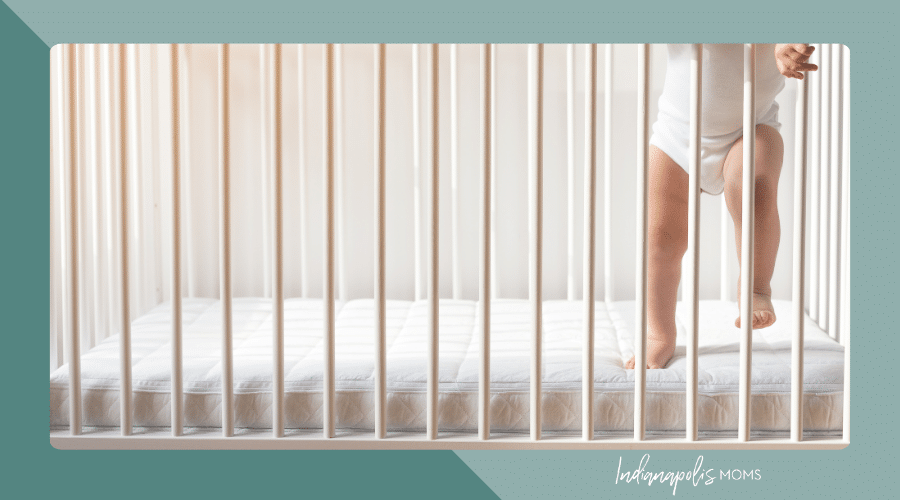 Disclaimer: The information provided on this blog is for general informational purposes only and is not intended as medical advice, diagnosis, or treatment.
Disclaimer: The information provided on this blog is for general informational purposes only and is not intended as medical advice, diagnosis, or treatment.
Is there anything that can make a new parent crazier than a baby who won’t sleep? When my firstborn was a baby, the girl hated sleep. She would nap for thirty-six minutes on the dot, then wake up ready to take on the afternoon.
Figuring out how to get her to sleep was a long journey that later impacted how I handled sleep with my other two kids (read: I went crazy and wouldn’t let anyone mess even the slightest bit with nap time!). I tried to find help online and in books, but sifting through conflicting, confusing, and sometimes emotionally-charged, advice about baby sleep is tough.
I spoke with Natalie Nevares, founder and CEO of Mommywise, to hear about common misconceptions parents have about baby sleep. During our conversation, Natalie shed light on three confusing areas of baby sleep: when to start sleeping training, what “drowsy but awake” really means, and why relying on sleep associations can do more harm than good when it comes to babies learning to sleep independently. Natalie offered not only sound advice but a lot of hope, and as any sleep-deprived parent will tell you, that hope can make a world of difference!
Misconception 1: When should I start sleep training?
A common area of confusion about baby sleep is when to actually start any type of sleep training. Natalie believes you can begin laying a foundation for healthy sleep right away, calling it sleep conditioning. “You can start sleep conditioning from day one, feeding them when they’re more alert and awake, keeping them up for a little while, letting them digest, and then putting them down when they’re swaddled up and tired, even if they fuss a little bit. A newborn can fall asleep independently without rocking and feeding to sleep.
“Parents can start sleep training at about three months. I say about three months because we tend to look for the baby to be about 12 pounds and about 12 weeks when they’re at least able to get their hands to their mouths to self-soothe.”
Natalie shared that some parents often think they need to wait until their baby gets past the four-month sleep regression (that actually begins at three months as babies transition out of the newborn stage) to sleep train. However, during this transition, it’s the best time to sleep train. Natalie said at that age, babies might “start waking up the minute you try transferring them to the crib, and they might start waking up more in the middle of the night. Naps might start to get shorter to thirty minutes.” Natalie encouraged parents to think of this as “their baby’s way of saying something isn’t working. We need to change some things around here.”
Misconception 2: What Does “Drowsy but Awake” really mean?
Spend any time browsing the internet for advice about baby sleep, and you’ll encounter the advice to put the baby down for bed when they’re “drowsy, but awake.” Natalie shared how she thinks this is confusing for parents as they try to gauge what “drowsy” actually means for their baby. “Parents think that there’s some magical moment where babies are droopy in their arms, and then they can put them down, and they’ll stay asleep. But often, what happens in that moment is that they’re more asleep, and then you wake them up by putting them down. The one thing that most people would be surprised about is that that drowsy but awake actually means put your baby down fully awake.”
Natalie recommends putting your baby down “wide awake and expect that there are going to be tears, but don’t be afraid of the tears. See if you can understand what the baby’s trying to tell you. Are they just frustrated or mad? Or do they actually need something like food or a diaper change?” Natalie said, “Those kinds of things I think are important to consider rather than jumping in out of habit or fear that something’s wrong, but really try and step back and watch the monitor looking for facts as opposed to your emotions.”
Misconceptions 3: What are Sleep Associations?
I had a lot of crutches I used to get my firstborn to bed, but the worst was relying on the stroller to help her take her afternoon nap. I vividly remember pushing in her stroller, half-asleep myself, when a phrase popped into my head: Do mommies ever sleep? Baby legend has it—no. This eventually became the opening line of my picture book Do Mommies Ever Sleep? Because I couldn’t shake the feeling that from my little girl’s perspective, I was always there, wide awake, ready to play, just like her.
Natalie shared that a common mistake she sees parents make is “helping your baby to sleep but then expecting that they can also sleep through the night.” Natalie said, “If you’re helping your baby to sleep, that’s the precedent you’re setting. Therefore, in the middle of the night, when they wake up, they’re looking for your support and need your support to go back to sleep.
“One thing that I tell parents over and over again is the idea of sleep associations. We all have sleep associations. For example, we’re used to going to bed with a bed and a pillow, and when we wake up in the middle of the night, we know how to roll back over and go back to sleep.
“But if you think of that from your baby’s perspective, if they’re used to you as a pillow, and then they wake up in the middle of the night and their pillow is gone, they’re going to be looking for that pillow and need your support.” Laying the foundation of putting your baby down while they’re still awake gives them the space to learn to self-soothe and fall asleep on their own.
Final word: Give yourself some grace
If a parent is struggling and has no idea what to do to get their baby to sleep, Natalie has some words of encouragement to share. “The first thing I would say to that parent is not to judge themselves for not having the problem fixed. And not to judge themselves if they need to call in outside support.” Natalie says parents can feel a lot of shame and guilt for not being able to figure out baby sleep on their own, but with how confusing or overwhelming information online is, they’d actually find they’re in good company with lots of other parents.
If that’s where you’re at right now, experiencing shame, guilt, and frustration over baby sleep, you are not alone. The craziness of baby sleep unites all parents. Reach out for support however you can, whether through friends, families, or experts, so you can all get the rest you need!








